Are you looking for a cuddly companion that’s small in size but big in personality? Meet the Maltese puppy! This adorable toy dog breed, known for its luxurious white coat and friendly nature, is perfect for individuals and families. Maltese dogs, one of the youngest puppies in the spaniel family, thrive on attention and love to shower their human companions with affection. Dating back thousands of years, the Maltese breed has been stealing hearts since ancient times. If you’re searching for a pint-sized canine with oodles of charm, look no further than the Maltese breed.
The Maltese, a small dog breed from Malta, effortlessly captures hearts with its irresistible cuteness and playful antics. These tiny bundles of joy, including young puppies, will bring endless happiness to your life.
Table of Contents
- 1 History and Origins of the Maltese Breed
- 2 Characteristics and Temperament of Maltese Dogs
- 3 Comprehensive Guide to Caring for a Maltese Puppy
- 4 Training and Socializing Your Maltese Puppy
- 5 Grooming Tips and Maintenance for Maltese Puppies
- 6 Ensuring the Health and Wellness of Your Maltese Puppy
- 7 Embracing the Charm of Maltese Puppies
- 8 Related posts:
- 9 Discover Maltese Dog Temperament
- 10 Maltese Dog Breed: Facts & Care
History and Origins of the Maltese Breed
The Maltese, a toy breed of small dogs, has a fascinating history dating back centuries. Originating in Malta, an island nestled in the Mediterranean Sea, these adorable puppies have captured the hearts of many throughout time. They are characteristic dogs, similar to Spaniels.
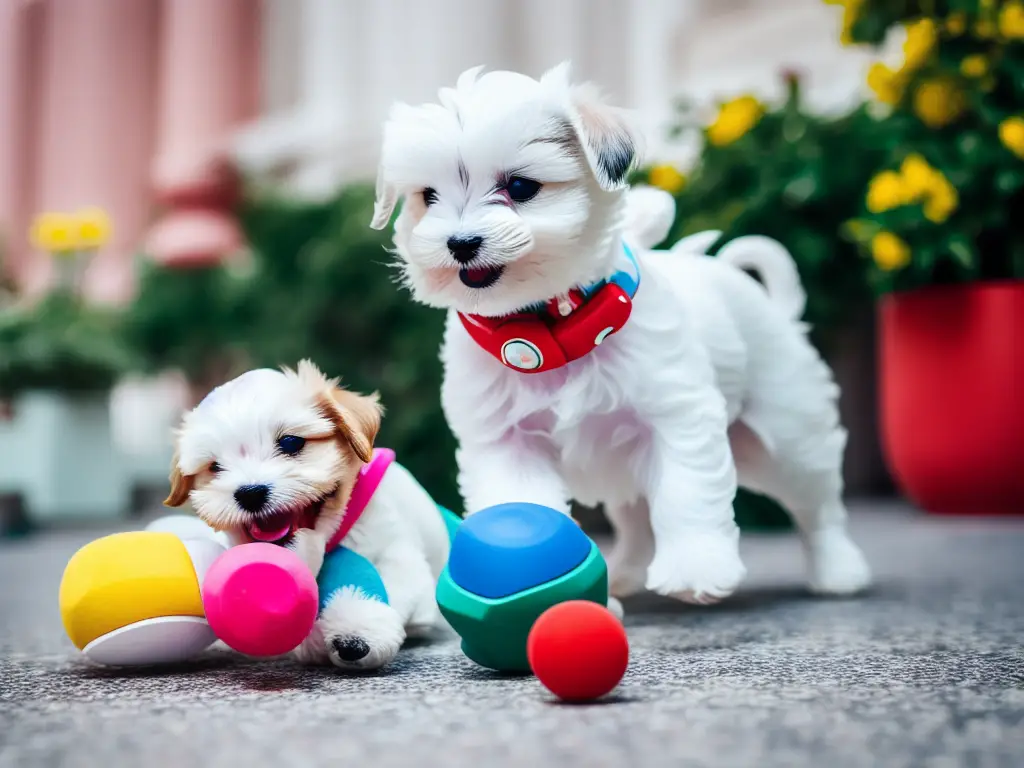
Ancient civilizations such as the Egyptians and Romans held the Maltese dog, a toy breed with spaniel characteristics, in high regard for its exquisite beauty and undeniable charm. These societies recognized the unique qualities possessed by this breed long before their popularity spread worldwide.
Throughout history, Maltese dogs have been cherished as loyal companions in Malta. They often accompanied nobles and aristocrats, serving as loyal confidants to those of high stature. The breed’s regal presence and characteristic allure only added to its desirability.
Today’s Maltese puppies, a toy breed, are direct descendants of these ancient lapdogs. Their lineage can be traced back through generations, with a rich heritage spanning centuries. Their innate elegance and captivating nature make them popular with families with children.
Characteristics and Temperament of Maltese Dogs
The Maltese breed is a popular toy breed known for its small size. These pups typically weigh between 4 and 7 pounds. With their distinctive silky white coat, regular grooming is necessary to keep them looking pristine. Despite their delicate appearance, Maltese dogs are energetic and playful companions who enjoy daily exercise. They are brilliant and can be easily trained using positive reinforcement techniques.
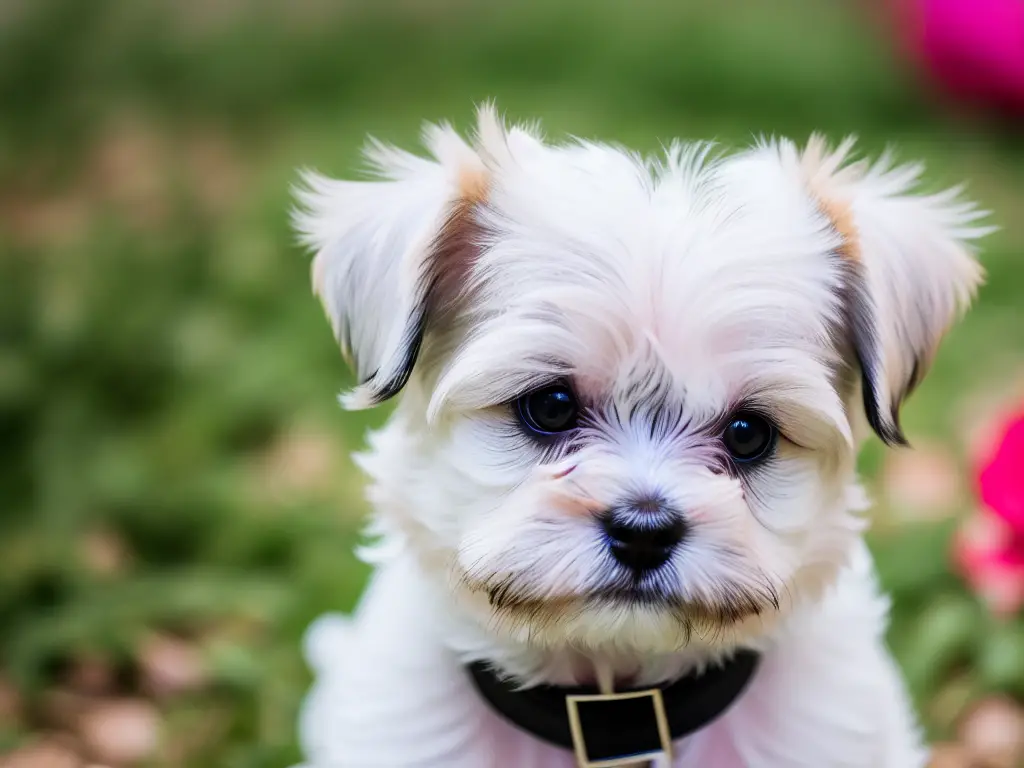
Here are some critical characteristics of Maltese dogs:
- Size: Maltese dogs are a popular toy breed known for their small size. They typically weigh between 4 and 7 pounds, making them one of the most miniature breeds. If you’re looking for a tiny pup, the Maltese is a great choice.
- Maltese dogs are known for their distinctive silky white coat, making them one of the most beautiful dog breeds. Regular grooming is necessary to maintain the beauty of this characteristic coat. Whether you have a Maltese pup or an adult dog, proper care and grooming are essential.
- Maltese dogs, a breed from Malta, are energetic despite their small size and enjoy daily exercise. This is a characteristic of this pup.
- These playful dog breeds love engaging in interactive games with their owners. They are known for their characteristic playfulness and are an excellent choice for people who enjoy playing with their pups.
- Intelligence: Maltese dogs are intelligent breeds who learn new commands and tricks quickly. This characteristic makes them popular for people seeking an intelligent and trainable dog. For more information on the intelligence of Maltese dogs, read on.
- Maltese dogs, a toy breed known for their intelligence and eagerness to please, are highly trainable. They respond well to positive reinforcement training methods.
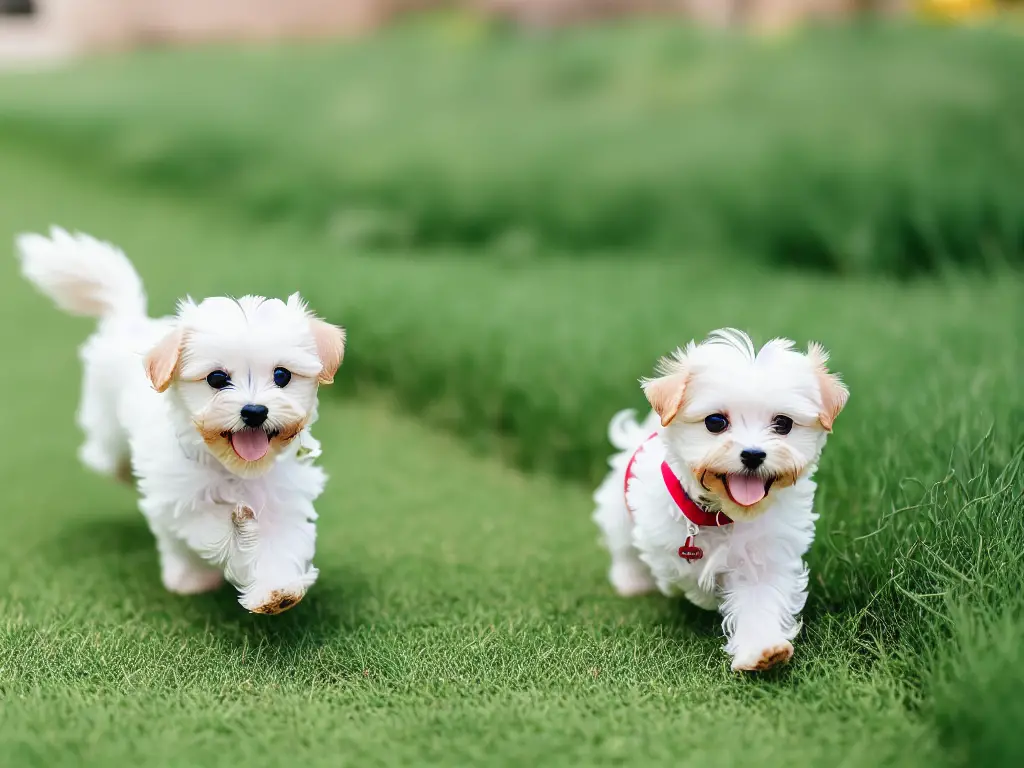
In terms of temperament, Maltese dogs exhibit the following breeds’ characteristic traits. This information is essential for potential owners to understand the specific needs of this breed.
- The Maltese dog is an affectionate breed known for its strong bonds with its owners. They thrive on human companionship and need it to be happy.
- Maltese dogs are gentle breeds. Despite their playful nature, they exhibit peaceful behavior towards both people and other animals. For more information about the characteristic traits of Maltese dogs, continue reading.
- Maltese dogs are known for their alertness, making them excellent watchdogs. They have the characteristic of barking to alert their owners of potential threats. If you’re looking for information on alert breeds that make good watchdogs, the Maltese breed is one you need to consider.
- Dog breeds have different levels of adaptability. They can adapt well to various living situations, including apartments or houses with yards. This is a characteristic that all dogs need.
Comprehensive Guide to Caring for a Maltese Puppy
Proper nutrition is essential for maintaining the health of your Maltese puppy. Consult with your veterinarian for specific dietary recommendations for this dog breed. They can provide the necessary information and guidance to ensure your puppy gets nutrients. A well-balanced diet will support their growth and keep them healthy.
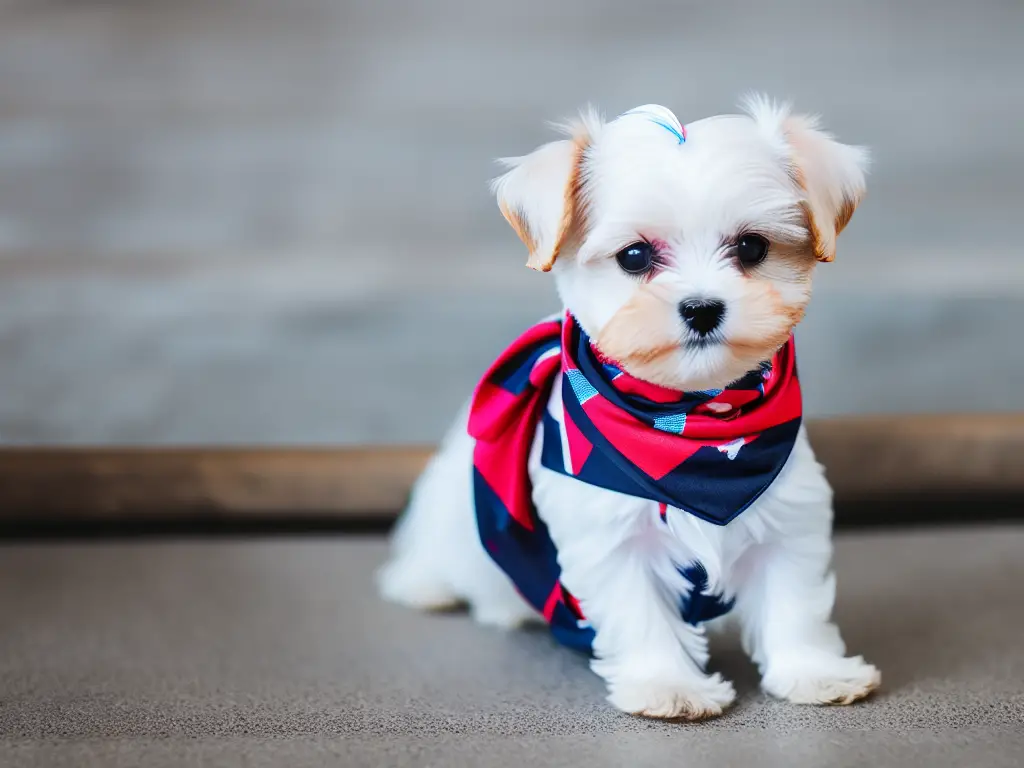
Regular veterinary check-ups are crucial to monitor your Maltese puppy’s overall well-being and address potential health issues early on. These check-ups provide essential information on dog breeds, allowing the vet to detect underlying conditions or diseases before becoming more serious. Your vet will also provide necessary vaccinations, deworming, and flea/tick prevention treatments to ensure the characteristic health of your dog.
Provide your Maltese puppy with plenty of mental stimulation through interactive toys or puzzle games to prevent boredom behavior. These intelligent little dogs thrive on mental challenges, so engaging activities will help keep them entertained and mentally sharp. This breed requires mental stimulation to prevent boredom and keep them mentally strong. Interactive toys or puzzle games are great ways to provide this information to Maltese puppies.
Socialization from an early age is essential for all dog breeds, including Maltese puppies. Exposing them to various people, animals, sounds, and environments is critical to prevent fearfulness or aggression in unfamiliar situations later in life. This information will help you understand the characteristic needs of your Maltese puppy.
Training and Socializing Your Maltese Puppy
Start training your Maltese puppy early to develop their characteristic behavior using positive reinforcement techniques such as treats and praise. Consistency is key when training a Maltese puppy of different breeds; establish clear rules and boundaries. Socialize your Maltese puppy with other dogs, people, and environments to help them become confident and well-behaved adults with characteristic traits. Use short training sessions to keep your Maltese puppy engaged and prevent them from becoming overwhelmed by their typical behavior.

It’s essential to start early with dog training. Begin teaching basic obedience commands to different dog breeds, such as “sit,” “stay,” and “come,” using positive reinforcement methods. Reward your pup with tasty treats or enthusiastic praise when they successfully follow your instructions.
Consistency is crucial in training a Maltese puppy. Establishing clear rules and boundaries for your dog will help them understand acceptable behaviors. Be firm but gentle in enforcing these rules, ensuring everyone follows them consistently with your dog.
Socialization plays a vital role in raising a well-rounded Maltese dog. Introduce your puppy to various dogs, people, and environments during their early months. This exposure will help them develop social skills, reduce anxiety around strangers, and promote good behavior around other animals.
Short training sessions work best for Maltese puppies due to their attention span. Keep these dog training sessions fun and engaging by incorporating playtime with chew toys or interactive games. Avoid overwhelming your dog with long training sessions that may cause frustration or boredom.
In addition to regular obedience training, provide plenty of physical exercise for your Maltese dog puppy. They have moderate activity levels and enjoy daily walks or playtime in a secure area where they can safely explore their surroundings.
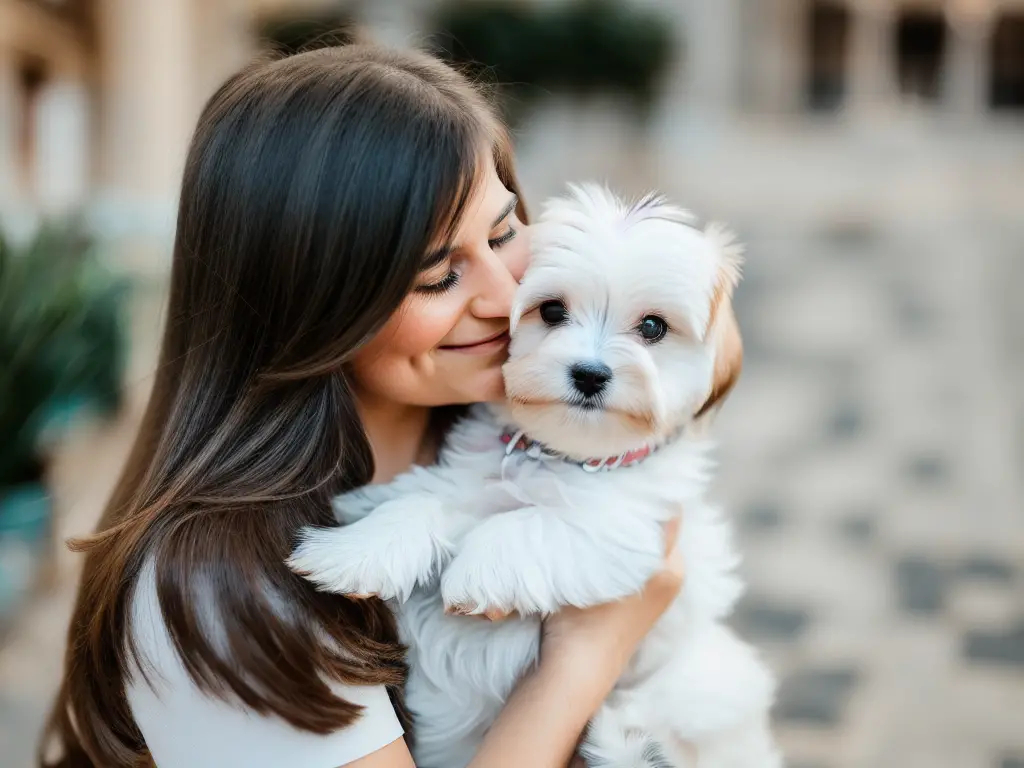
Remember that each Maltese puppy is unique, so adapt the dog training approach based on their dog’s personality and learning style. Some dogs may respond better to verbal cues, while others require more visual or physical prompts.
Starting early, being consistent, socializing your dog, and keeping training sessions short and engaging set them up for a lifetime of good behavior and happiness. So grab those treats, gather some toys, and get ready to have fun while training your adorable dog!
Grooming Tips and Maintenance for Maltese Puppies
Regular brushing prevents matting in your Maltese puppy’s long, silky coat. Their dog hair requires special attention due to its length and texture. Here are some dog grooming tips to keep your furry friend looking their best.
- Brushing: Daily, brush your Maltese puppy’s hair with a slicker brush or comb. This helps remove tangles, prevents matting, and keeps their coat shiny. Be gentle to avoid causing any discomfort.
- Bathing: Bath your Maltese puppy every month or as needed. Use a gentle dog shampoo specifically formulated for sensitive skin. Rinse thoroughly to remove all traces of shampoo, and towel dry gently.
- Dental Hygiene: Pay attention to your Maltese puppy’s dental health by regularly brushing their teeth with a dog-friendly toothbrush and toothpaste. This helps prevent tartar buildup and maintains fresh breath. Provide appropriate chew toys to promote good oral hygiene.
- Eye Care: Keep the hair around your Maltese puppy’s eyes clean and trimmed to avoid irritation or eye infections. Use blunt-end scissors to cut the hair around their eyes, ensuring it doesn’t obstruct their vision.
Proper grooming is crucial for maintaining the health and appearance of your Maltese puppy. By following these tips, you can ensure your dog looks their best with their beautiful white hair shining brightly.
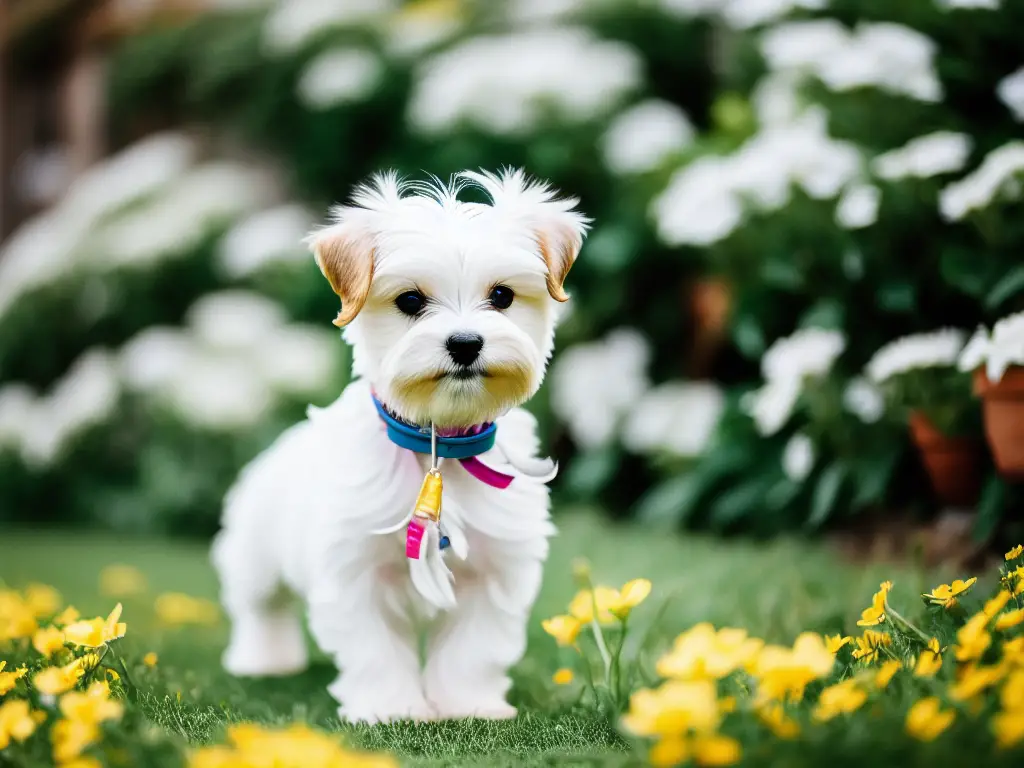
Always approach dog grooming with patience and care, making it an enjoyable experience for you and your adorable Maltese dog companion!
Ensuring the Health and Wellness of Your Maltese Puppy
Regular Vaccinations, Deworming, and Flea/Tick Prevention Treatments
- Schedule routine vaccinations, deworming, and flea/tick prevention treatments for your dog with your veterinarian.
- Protect your Maltese puppy from common health issues.
Monitoring Weight and Proper Feeding
- Monitor your Maltese puppy’s weight to ensure a healthy body condition for your dog.
- Consult with your vet for guidance on proper feeding amounts for your dog.
Genetic Health Conditions
- Be aware of potentially genetic health conditions that can affect the Maltese breed, including issues specific to dogs.
- Take preventive measures accordingly.
Regular Exercise for Physical Fitness and Mental Stimulation
- Provide regular exercise opportunities for your Maltese puppy.
- Keep them physically fit and mentally stimulated.
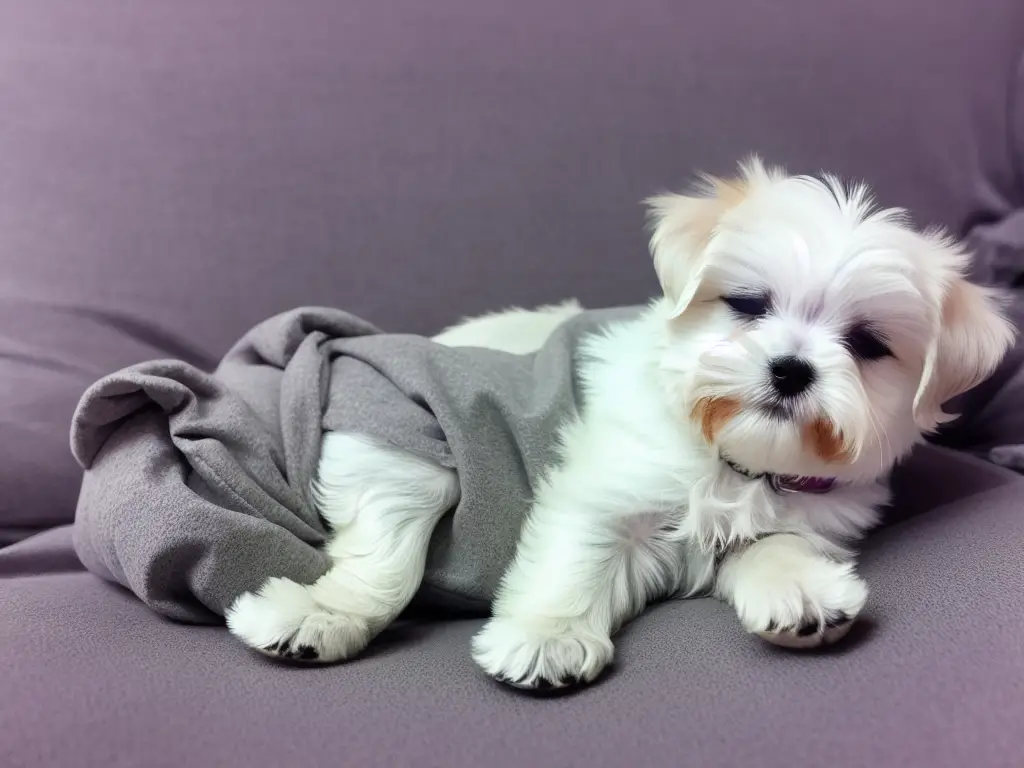
By following these guidelines, you can ensure the health and wellness of your Maltese dog. Remember to schedule regular vaccinations, deworming, and flea/tick prevention treatments to protect against common dog health issues. Monitoring their weight is essential to maintain a healthy body condition, so consult with your vet for proper dog feeding amounts. Be aware of potentially genetic dog health conditions that may affect the Maltese breed, such as luxating patella or dental problems. Taking preventive measures can help minimize dog health risks. Lastly, don’t forget to provide regular exercise opportunities for your Maltese dog. This will keep them physically fit and mentally stimulated.
Embracing the Charm of Maltese Puppies
In conclusion, embracing the charm of Maltese puppies is a delightful experience that brings joy and companionship into your life. Understanding the history and origins of this breed gives us insight into their rich heritage and legacy. The characteristics and temperament of Maltese dogs make them lovable family pets, known for their affectionate nature and playful personality.
Caring for a Maltese puppy requires attention to its specific dog needs, which we have covered comprehensively in this dog guide. From training and socializing to grooming tips and dog maintenance, we have provided you with valuable dog information to ensure the well-being of your furry friend.
To ensure the health and wellness of your dog, it is essential to prioritize regular veterinary check-ups, vaccinations, and a balanced diet. Following these guidelines can provide your beloved companion with a happy and fulfilling life.
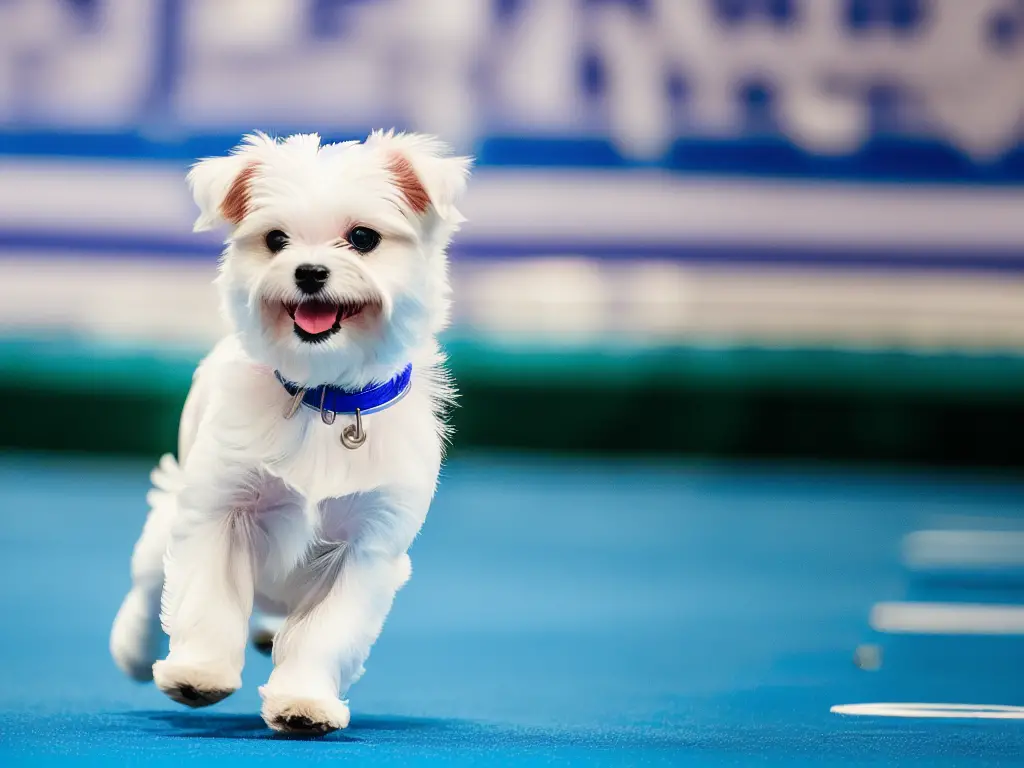
Remember that owning a Maltese puppy is not just about having a dog; it’s about welcoming an adorable bundle of joy into your home. Their loyalty and unconditional love will bring endless happiness to your life.
So why wait? Start your journey with a Maltese puppy today and experience the pure joy they bring while creating unforgettable memories with your dog.
FAQs
Are Maltese puppies good with children?
Maltese puppies are generally good with children as they are naturally friendly and gentle. However, it’s important to supervise interactions between young children and puppies to ensure the dog and the children are safe.
How often should I groom my Maltese puppy?
Grooming your dog, the Maltese puppy, at least once every two weeks is recommended to maintain its beautiful coat. Regular brushing helps prevent matting and keeps their fur clean.
Can I train my Maltese puppy myself?
You can train your Maltese puppy with patience and consistency. Positive reinforcement techniques work best for dog training, such as rewarding good behavior with treats or praise.
Do Maltese puppies require a lot of exercise?
While Maltese puppies, a small breed of dog, enjoy short walks and playtime, they do not require excessive exercise. They are well-suited for apartment living and can get their energy out through indoor activities.
Are Maltese puppies prone to any health issues?
Like all dog breeds, Maltese puppies may be prone to specific health issues such as dental problems, luxating patellas, or eye conditions. Regular vet check-ups can help detect and address any potential concerns early on.